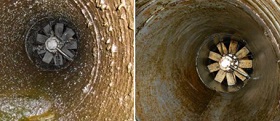Safe ductwork - Loss Prevention Standard (LPS 2084)
The Regulatory Reform (Fire Safety) Order 2005 requires that a building’s owner or workplace manager nominates a responsible person to identify all possible sources of fire and eliminate, or at least minimise the risk, to the building’s occupants.
Regular kitchen extraction cleaning will remove one of the most common causes of fire within the kitchen and is imperative to ensure the safety of the building and its occupants and reduce the risk of a fire caused by grease build-up in the extraction system.
Regardless of the efficiency of canopy filters, it is inevitable that grease deposits will build up over time in kitchen extraction ductwork and canopies. If left, grease will become baked on and carbonised making it extremely difficult to remove, thus reducing the effectiveness of the extraction system, potentially shortening the life of the fan and creating a serious fire hazard that may propagate around the building.
The Loss Prevention Standard (LPS 2084), published in May 2017 by BRE Global, seeks to minimise fire risk from ducting. It was prepared in response to issues caused by ineffective cleaning and maintenance and defines the Loss Prevention Certification Board (LPCB) requirements for the approval of companies carrying out inspection, cleaning and maintenance of ductwork systems that may be contaminated with combustible deposits.
Using a company certified to LPS 2084 will give clients the assurance that the cleaning and maintenance of their ductwork systems has been carried out correctly.
Certified companies with LPS 2084 have to:
- Meet the requirements of the client contract.
- Document and report correctly.
- Identify and record areas of limited access where inspection, cleaning and maintenance are impractical and communicate these limitations to the client.
- Provide recommendations for access improvements to better facilitate the ongoing cleaning and maintenance of the ductwork system.
LPS 2084 is of great importance in an industry with little regulation.
Certified companies will be audited by BRE Global on a regular basis to ensure they continue to adhere to the requirements of the standard. Auditors will check records and supporting documentation covering the contract itself, storage and handling of cleaning materials, disposal, training and so on.
Specifying LPCB approved products and services enables the responsible person to reduce risk by showing due-diligence in the selection of products and services that can be trusted to perform as specified.
This article was originally published here on 17 July 2017 by BRE Group.
[edit] Find out more
[edit] Related articles on Designing Buildings Wiki
Featured articles and news
Building Safety recap January, 2026
What we missed at the end of last year, and at the start of this...
National Apprenticeship Week 2026, 9-15 Feb
Shining a light on the positive impacts for businesses, their apprentices and the wider economy alike.
Applications and benefits of acoustic flooring
From commercial to retail.
From solid to sprung and ribbed to raised.
Strengthening industry collaboration in Hong Kong
Hong Kong Institute of Construction and The Chartered Institute of Building sign Memorandum of Understanding.
A detailed description fron the experts at Cornish Lime.
IHBC planning for growth with corporate plan development
Grow with the Institute by volunteering and CP25 consultation.
Connecting ambition and action for designers and specifiers.
Electrical skills gap deepens as apprenticeship starts fall despite surging demand says ECA.
Built environment bodies deepen joint action on EDI
B.E.Inclusive initiative agree next phase of joint equity, diversity and inclusion (EDI) action plan.
Recognising culture as key to sustainable economic growth
Creative UK Provocation paper: Culture as Growth Infrastructure.
Futurebuild and UK Construction Week London Unite
Creating the UK’s Built Environment Super Event and over 25 other key partnerships.
Welsh and Scottish 2026 elections
Manifestos for the built environment for upcoming same May day elections.
Advancing BIM education with a competency framework
“We don’t need people who can just draw in 3D. We need people who can think in data.”
Guidance notes to prepare for April ERA changes
From the Electrical Contractors' Association Employee Relations team.
Significant changes to be seen from the new ERA in 2026 and 2027, starting on 6 April 2026.
First aid in the modern workplace with St John Ambulance.
Solar panels, pitched roofs and risk of fire spread
60% increase in solar panel fires prompts tests and installation warnings.
Modernising heat networks with Heat interface unit
Why HIUs hold the key to efficiency upgrades.


























